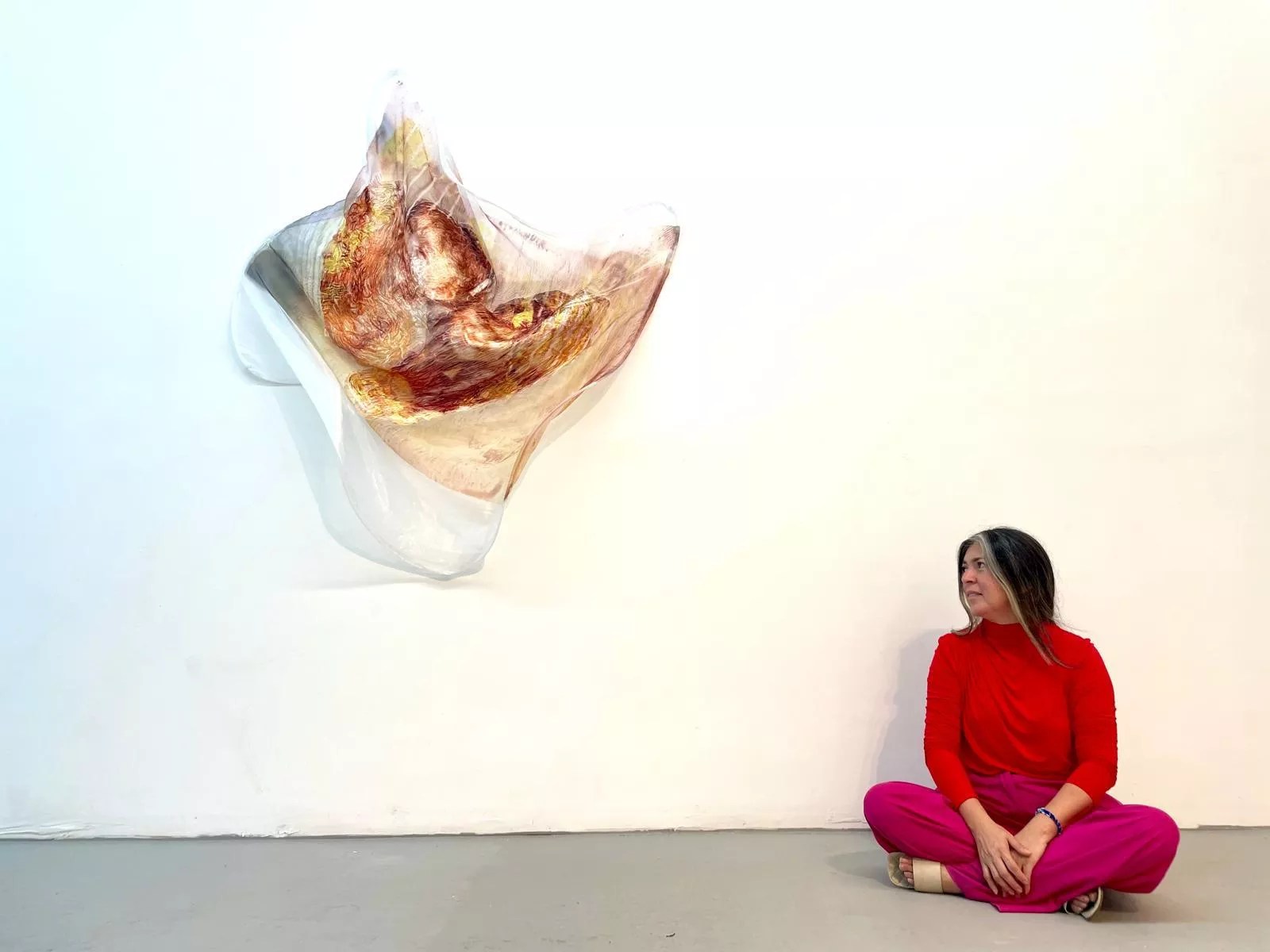
Photo by ArtSeen365/@artseen365

Audio By Carbonatix
When I first walk into the Frank Museum’s back gallery for the opening of “Ebb & Flow: Exploring the Womanhood Continuum,” I’m immediately struck by the scale of artist Lisu Vega’s textiles. Hanging 10 to 15 feet above the ground, the sheer pieces with hauntingly faded family photos engulf the viewer.
Vega, a multidisciplinary textile artist who uses family archives, photo printing, and recycled materials to create installation-based, pseudo-abstract pieces, will take part in another group exhibition at the Frank this fall. Earlier this year, she showed a solo installation at Little Havana’s Tunnel Projects titled, “Memoria Perdida,” and she’s currently on display at the Orlando Museum of Art as part of the “2025 Florida Prize in Contemporary Art” exhibition, which spotlights “the most progressive artists in the state,” awarding a $20,000 award to one of the selected participants. The latter exhibition, on display through August 24, incorporates tapestries using photos Vega took in Miami and while traveling through Europe, a commentary on the ways in which people weave together memories.
I first met Vega in one of Laundromat Art Space’s open studios, a space she shares with her husband, painter Juan Henriquez. We spent hours discussing family, the work of memorializing roots, and finding home through places and people to which you no longer have access. Vega frequently touches on these topics in her work, often through centering her two grandmothers. A photo of her maternal grandmother, nicknamed “Yiya,” is printed in a large-scale textile in the middle of her home studio.
“It was always about the love of family and creating memories, and connecting it with my grandmother, who was a seamstress,” Vega says of her pieces. “The love she had for her family – sewing helped her get ahead and raise her children.”

Lisu Vega’s installation for the “Ebb & Flow,” exhibition at the Frank in Pembroke Pines.
Photo by Mario Rodriguez
Like the textile hanging in her home studio, Vega’s work often incorporates imagery from her childhood. Viewers will encounter images of her family home in Cabimas, Venezuela. But the movement of the fabric, the winding knots of the embroidery and knitting, and the textured surfaces on which the images are imprinted make some of these scenes difficult to discern.
Obfuscation is the point. “I’m using [a technique] to stamp an image, and I have a trace, so it seems like it’s there,” she explains. “But you probably won’t be able to see the original image anymore. It’s light, and almost gone. You have some remnants, but it’s the idea of the image.”
The effect is to visually relay how memories mold and fade away in our minds, becoming something new as they are recalled, told, and retold. The memories become legacies even after the people who witnessed them are gone. In that spirit, Vega’s printed images are linked to one another, threaded together, layered, and amalgamated to make large-scale bodies of memory, depicting generations of happy lifetimes in one imposing floor-to-ceiling installation.
The work is made all the more poignant once one learns that Yiya exists only in those memories now. In 2021, Vega suddenly felt called to organize a family reunion in Cartagena, Colombia. She, her husband, and her children put their lives on sudden pause, and she booked a car for her grandmother to cross the Venezuelan border. After a week together, Yiya said goodbye. “She said, ‘Thank you, my girl. You have given me ten years of living,” Vega remembers. Just two months later, she died after a bout of COVID that put her in the hospital.

Lisu Vega with her grandmother Yiya.
Photo by Lisu Vega
The artist has spent the ensuing years deconstructing her grief in her work. “The day after her death, she came to me,” Vega, a deeply spiritual person, says of Yiya with tears in her eyes. “She said, ‘Don’t worry, my darling, I am okay.'”
The delicateness with which she approaches themes of memory, grief, and family also bleeds into her process. As her textile work would suggest, Vega is also a seamstress and fashion designer. She works through fabric very quickly, and the scraps she leaves behind are entirely used in her fine art. In turn, the exercise in material repurposing and waste minimization influences both the appearance of the resulting pieces and the productivity with which she can feasibly create them.
More significantly, as the materials live on in another form in Vega’s work, so do her ancestors.
“2025 Florida Prize in Contemporary Art.” On display through Sunday, August 24, at the Orlando Museum of Art, 2416 N. Mills Ave., Orlando; 407-896-4231; omart.org. Museum admission costs $20.